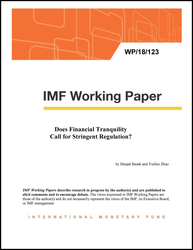
Does Financial Tranquility Call for Stringent Regulation?
Consistent with the Minsky hypothesis and the “volatility paradox” (Brunnermeier and Sannikov, 2014), recent empirical evidence suggests that financial crises tend to follow prolonged periods of financial stability and investor optimism. But does financial tranquility always call for more stringent regulation over time? We examine this question using a simple portfolio choice model that features the interaction between learning and externality. We evaluate the potential of a macroprudential policy to restore efficiency, and characterize the necessary and sufficient condition for the countercyclicality of the optimal regulation/macroprudential policy. Our paper implies that policymakers should not only consider the cyclical indicators “on the surface” (for example, credit growth), but also closely examine the deep structural change of the resilience of the system. The paper also highlights the importance of assigning the macroprudential policy function to independent agencies with technical expertise.
Publication date: May 2018
ISBN: 9781484357996
$18.00
Add to Cart by clicking price of the language and format you'd like to purchase
Available Languages and Formats
| English |
Prices in red indicate formats that are not yet available but are forthcoming.
Topics covered in this book
This title contains information about the following subjects.
Click on a subject if you would like to see other titles with the same subjects.
Financial stability , Financial regulation , Learning , Externality , Macroprudential
Summary
Copyright © 2010 - 2024
Powered by:
AIDC



